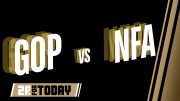
In what Fox News’ Tucker Carlson dubbed “the most shocking attack on freedom of speech in this country in our lifetime,” a federal jury convicted a social-media influencer of conspiracy for posting memes in 2016 suggesting that Hillary Clinton supporters text in their votes.
Douglass Mackey, known online as Ricky Vaughn, was convicted Friday of conspiring “to injure, oppress, threaten, or intimidate any person … in the free exercise or enjoyment of any right or privilege secured to him by the Constitution,” specifically the right to vote. He faces a maximum sentence of 10 years in prison.
According to a Department of Justice (DOJ) press release trumpeting Mackey’s conviction, “Between September 2016 and November 2016, Mackey conspired with other influential Twitter users and with members of private online groups to use social media platforms, including Twitter, to disseminate fraudulent messages that encouraged supporters of presidential candidate Hillary Clinton to ‘vote’ via text message or social media which, in reality, was legally invalid.”
One of the images Mackey tweeted featured a black woman in front of an “African Americans for Hillary” sign. The image, which was made to look like a Clinton campaign ad, urged the reader, “Avoid the Line. Vote from Home. Text ‘Hillary’ to 59925.’”
“Mackey was joking. Nobody believed he was a federal election official. In fact, his social media profile pictured a Donald Trump app. It was unmistakable this was mockery,” Carlson said Friday. “But in the wake of the 2016 election and the rising hysteria about President Trump, mocking the Democratic Party became a crime. So as a result, tonight Douglass Mackey faces 10 years in prison. The case against Doug Mackey is the most shocking attack on freedom of speech in this country in our lifetime.”
“Mackey’s insult did not alter a single vote in the election,” he averred. “No one has proved otherwise. The government brought forth not a single victim of this crime. It couldn’t.”
Indeed, the best “evidence” the DOJ could come up with — at least according to its press release — was that “at least 4,900” people complied with the memes’ instructions. How many of those actually thought they were voting for Clinton, and how many got the joke and just texted for kicks, are unknown. But in an election in which 138 million people cast ballots, it surely made no difference.
“Today’s verdict proves that [Mackey’s] fraudulent actions crossed a line into criminality and flatly rejects his cynical attempt to use the constitutional right of free speech as a shield for his scheme to subvert the ballot box and suppress the vote,” said U.S. Attorney Breon Peace.
However, observed University of California, Los Angeles (UCLA) law professor Eugene Volokh:
It’s not obvious that deceiving someone into voting in an invalid way qualifies as “injur[ing]” or “oppress[ing].” But if the statute does cover deception, then there’s nothing in the text limiting such deception to speech about the mechanics of voting. Alleged lies about the government or national security or the economy could also be prosecuted, if the government thought they were intended to discourage people from voting.
“The breadth of the Mackey indictment,” Volokh wrote, “is disquieting.” Under this precedent, simply discouraging get-out-the-vote efforts could be prosecuted. And since the law refers to all constitutional rights, it could also be used to criminalize urging a university to cancel an appearance by a particular speaker since a canceled appearance would infringe on the speaker’s free-speech rights.
“The truth isn’t always clear, and the line between fact and opinion is often blurry,” Aaron Terr of the Foundation for Individual Rights and Expression (FIRE) told the Daily Caller. “Giving the government a general power to police false election-related speech would have a disastrous chilling effect on political expression. The government would almost certainly abuse this power to selectively target its political adversaries’ speech.”
It would already appear to be doing so. Carlson pointed out that “a woman called Kristina Wong posted almost an identical meme” aimed at Donald Trump voters, “but unlike Doug Mackey, Wong voted for Hillary Clinton,” so she hasn’t been prosecuted.
Mackey’s attorney, Andrew Frisch, told the Washington Examiner he is “optimistic” that his client’s conviction will be overturned on appeal.



